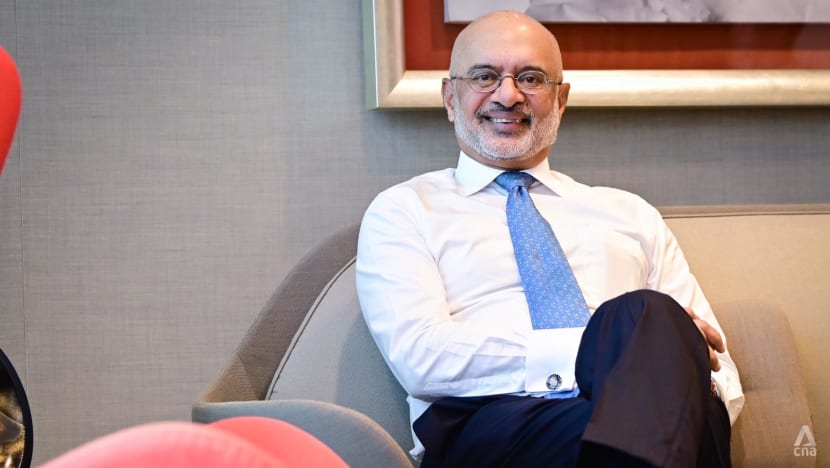DBS CEO Piyush Gupta on blame culture and ‘air cover’ when things go wrong
Piyush Gupta, leader of Southeast Asia’s largest bank for the last 13 years, has seen his fair share of crises including repeated service outages in recent months. He tells CNA’s Work It podcast hosts Crispina Robert and Adrian Tan how he tackles these challenges while avoiding a blame culture.

Profile picture of Piyush Gupta, CEO of DBS Bank on Jun 26, 2023. (Photo: CNA/Syamil Sapari)
SINGAPORE: What happens when Southeast Asia’s largest bank DBS faces an hours-long service outage, not once but twice in the span of a couple of months this year?
For CEO Piyush Gupta, rather than running for cover, he chooses accountability instead. The veteran banker said in CNA’s special podcast series The Leader’s Chair that he is a big believer in what former United States president Harry Truman had on his table, which said: “The buck stops here."
“It doesn’t matter what the nature of the problem is, as the CEO of the company, I’m accountable,” said the 63-year-old.
“Whether the problem was with a third-party provider, or with the errant employee, or it was just an accident … as far as the consumer is concerned, I’m the CEO of the bank so I’ve got to fix it.”
Listen:
This is in keeping with Mr Gupta’s approach to problem solving: In order to personalise the problem and understand what the issue is, he often “gets under the hood”.
Each year, he sets aside about eight projects he drives personally – rolling up his sleeves and drilling down into root causes. Bank outages like the ones DBS experienced are an example of an “unplanned” project, Mr Gupta said.
“I try to get under the hood to make sure I understand what the issue is and if we are properly organised around it, we know how to fix it,” he said.
A review of the May service outage revealed it was the result of human error in coding the programme that was used for system maintenance, Senior Minister Tharman Shanmugaratnam told parliament on Wednesday (Jul 5).
RESISTING A BLAME CULTURE
The bigger challenge, in his view, is how to provide “air cover” for his team while ensuring people remain accountable and have a deep sense of urgency.
"It's very easy to start beating up on people … frankly ... a lot of companies and environments have a blame culture. The minute you start beating up on people and create blame, then you start getting bad outcomes because it makes people fearful,” the DBS chief said.
Without a leader’s “air cover”, the team can lose confidence or worse, become too fearful to exercise judgement. He believes developing a team that feels accountable and able to exercise judgement is the hardest challenge when it comes to leadership.
Here are other highlights of this conversation:
HOW TO TRANSFORM A COMPANY
Gupta:
You’ve got to be a good storyteller and paint the narrative, and then you’ve got to be able to walk the talk.
The second big part is this: Received wisdom then and even now has always been that it's very hard for old companies to change, it’s very hard for old people to change. And it's something that I've never believed … look (at) those in their 40s and 50s and 60s. We're all changing in our personal lives.
When people have changed in their personal lives, why do we think they can't change in a company? I have this big belief that the problem is not with human beings; the problem is with the company.”
ON HOW FAILURE CHANGED HIM
Gupta: When you've seen the bottom of the barrel, which is what I thought I was seeing (when his own business went bust during the dotcom crash), it changes your outlook. It changed my appetite for risk. At the end of the day, the change is so rapid and change is accelerating ... without making some bets, without taking some moonshots, or taking some risks, you're not going to succeed.
In my 20s and 30s, building a career was probably my single biggest driver. How do I make sure that I can get ahead, I get promoted, I get a bigger job, I become the youngest managing director?
When I went through this mental anguish after (the business failed), I spent a long time trying to figure out what makes me enjoy life. What do I enjoy doing?
And the reason I came back to banking was no longer because I wanted to build a career. I came back to banking because I figured this is a subject I know well and I enjoy it, and I think I can make an impact.
HOW HIS MANAGEMENT STYLE CHANGED
Gupta: My leadership style has evolved … We have got to recognise that there’s been a shift. Human memory is not that important anymore because you can go find out, as long as you know what to look for.
The younger kids do want to make an impact sooner. They can multitask. They want to be CEO ... but at the same time, the truth is, they don't want to be small cogs in the wheel.
So, my style changed to see how I involve younger people and get to a more horizontal style of management, a more participative leadership style, as opposed to a more directional and directive leadership style.
DBS chief Piyush Gupta also shared what he calls the five “I” framework when recruiting talent. To find out, listen to the full conversation on our Work It podcast, available on all major podcast platforms.

















